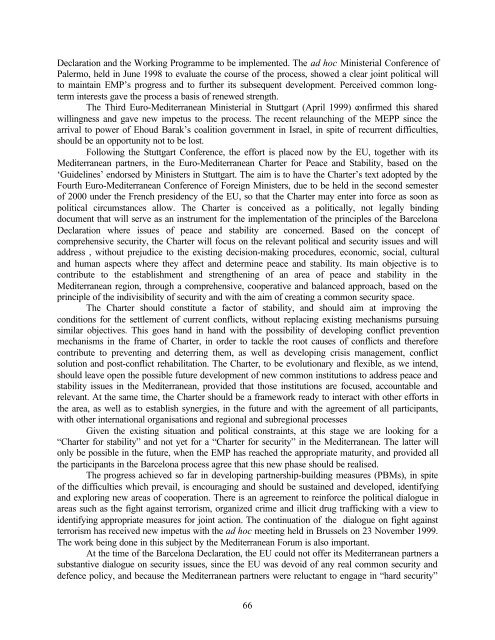The future of the Euro-Mediterannean security dialogue
The future of the Euro-Mediterannean security dialogue
The future of the Euro-Mediterannean security dialogue
Create successful ePaper yourself
Turn your PDF publications into a flip-book with our unique Google optimized e-Paper software.
Declaration and <strong>the</strong> Working Programme to be implemented. <strong>The</strong> ad hoc Ministerial Conference <strong>of</strong><br />
Palermo, held in June 1998 to evaluate <strong>the</strong> course <strong>of</strong> <strong>the</strong> process, showed a clear joint political will<br />
to maintain EMP’s progress and to fur<strong>the</strong>r its subsequent development. Perceived common longterm<br />
interests gave <strong>the</strong> process a basis <strong>of</strong> renewed strength.<br />
<strong>The</strong> Third <strong>Euro</strong>-Mediterranean Ministerial in Stuttgart (April 1999) confirmed this shared<br />
willingness and gave new impetus to <strong>the</strong> process. <strong>The</strong> recent relaunching <strong>of</strong> <strong>the</strong> MEPP since <strong>the</strong><br />
arrival to power <strong>of</strong> Ehoud Barak’s coalition government in Israel, in spite <strong>of</strong> recurrent difficulties,<br />
should be an opportunity not to be lost.<br />
Following <strong>the</strong> Stuttgart Conference, <strong>the</strong> effort is placed now by <strong>the</strong> EU, toge<strong>the</strong>r with its<br />
Mediterranean partners, in <strong>the</strong> <strong>Euro</strong>-Mediterranean Charter for Peace and Stability, based on <strong>the</strong><br />
‘Guidelines’ endorsed by Ministers in Stuttgart. <strong>The</strong> aim is to have <strong>the</strong> Charter’s text adopted by <strong>the</strong><br />
Fourth <strong>Euro</strong>-Mediterranean Conference <strong>of</strong> Foreign Ministers, due to be held in <strong>the</strong> second semester<br />
<strong>of</strong> 2000 under <strong>the</strong> French presidency <strong>of</strong> <strong>the</strong> EU, so that <strong>the</strong> Charter may enter into force as soon as<br />
political circumstances allow. <strong>The</strong> Charter is conceived as a politically, not legally binding<br />
document that will serve as an instrument for <strong>the</strong> implementation <strong>of</strong> <strong>the</strong> principles <strong>of</strong> <strong>the</strong> Barcelona<br />
Declaration where issues <strong>of</strong> peace and stability are concerned. Based on <strong>the</strong> concept <strong>of</strong><br />
comprehensive <strong>security</strong>, <strong>the</strong> Charter will focus on <strong>the</strong> relevant political and <strong>security</strong> issues and will<br />
address , without prejudice to <strong>the</strong> existing decision-making procedures, economic, social, cultural<br />
and human aspects where <strong>the</strong>y affect and determine peace and stability. Its main objective is to<br />
contribute to <strong>the</strong> establishment and streng<strong>the</strong>ning <strong>of</strong> an area <strong>of</strong> peace and stability in <strong>the</strong><br />
Mediterranean region, through a comprehensive, cooperative and balanced approach, based on <strong>the</strong><br />
principle <strong>of</strong> <strong>the</strong> indivisibility <strong>of</strong> <strong>security</strong> and with <strong>the</strong> aim <strong>of</strong> creating a common <strong>security</strong> space.<br />
<strong>The</strong> Charter should constitute a factor <strong>of</strong> stability, and should aim at improving <strong>the</strong><br />
conditions for <strong>the</strong> settlement <strong>of</strong> current conflicts, without replacing existing mechanisms pursuing<br />
similar objectives. This goes hand in hand with <strong>the</strong> possibility <strong>of</strong> developing conflict prevention<br />
mechanisms in <strong>the</strong> frame <strong>of</strong> Charter, in order to tackle <strong>the</strong> root causes <strong>of</strong> conflicts and <strong>the</strong>refore<br />
contribute to preventing and deterring <strong>the</strong>m, as well as developing crisis management, conflict<br />
solution and post-conflict rehabilitation. <strong>The</strong> Charter, to be evolutionary and flexible, as we intend,<br />
should leave open <strong>the</strong> possible <strong>future</strong> development <strong>of</strong> new common institutions to address peace and<br />
stability issues in <strong>the</strong> Mediterranean, provided that those institutions are focused, accountable and<br />
relevant. At <strong>the</strong> same time, <strong>the</strong> Charter should be a framework ready to interact with o<strong>the</strong>r efforts in<br />
<strong>the</strong> area, as well as to establish synergies, in <strong>the</strong> <strong>future</strong> and with <strong>the</strong> agreement <strong>of</strong> all participants,<br />
with o<strong>the</strong>r international organisations and regional and subregional processes<br />
Given <strong>the</strong> existing situation and political constraints, at this stage we are looking for a<br />
“Charter for stability” and not yet for a “Charter for <strong>security</strong>” in <strong>the</strong> Mediterranean. <strong>The</strong> latter will<br />
only be possible in <strong>the</strong> <strong>future</strong>, when <strong>the</strong> EMP has reached <strong>the</strong> appropriate maturity, and provided all<br />
<strong>the</strong> participants in <strong>the</strong> Barcelona process agree that this new phase should be realised.<br />
<strong>The</strong> progress achieved so far in developing partnership-building measures (PBMs), in spite<br />
<strong>of</strong> <strong>the</strong> difficulties which prevail, is encouraging and should be sustained and developed, identifying<br />
and exploring new areas <strong>of</strong> cooperation. <strong>The</strong>re is an agreement to reinforce <strong>the</strong> political <strong>dialogue</strong> in<br />
areas such as <strong>the</strong> fight against terrorism, organized crime and illicit drug trafficking with a view to<br />
identifying appropriate measures for joint action. <strong>The</strong> continuation <strong>of</strong> <strong>the</strong> <strong>dialogue</strong> on fight against<br />
terrorism has received new impetus with <strong>the</strong> ad hoc meeting held in Brussels on 23 November 1999.<br />
<strong>The</strong> work being done in this subject by <strong>the</strong> Mediterranean Forum is also important.<br />
At <strong>the</strong> time <strong>of</strong> <strong>the</strong> Barcelona Declaration, <strong>the</strong> EU could not <strong>of</strong>fer its Mediterranean partners a<br />
substantive <strong>dialogue</strong> on <strong>security</strong> issues, since <strong>the</strong> EU was devoid <strong>of</strong> any real common <strong>security</strong> and<br />
defence policy, and because <strong>the</strong> Mediterranean partners were reluctant to engage in “hard <strong>security</strong>”<br />
66
















